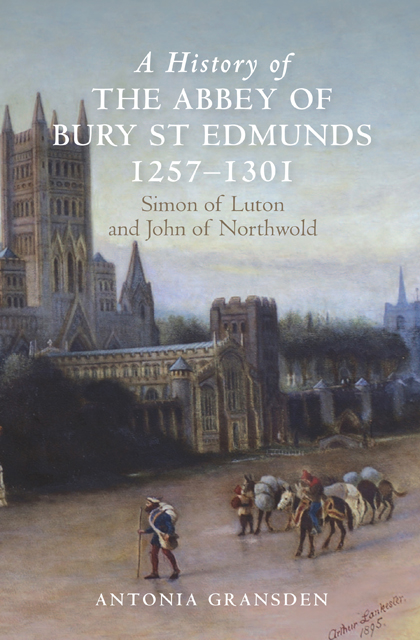Book contents
- Frontmatter
- Dedication
- Contents
- List of plates
- List of figures
- Preface
- Editorial note
- Dedication
- Acknowledgements
- Abbreviations
- Maps and plans (figures 1–11)
- Part I Introduction
- Part II Abbatial Governance
- Part III The Abbey’s Economy
- Part IV Religious Life and Reform
- Part V Intellectual and Cultural Life
- Appendix I The identity of the abbot’s justices, Henry of Guildford and Henry of Shenholt (in 1287)
- Appendix II The monks’ dietary regime: their food and drink
- Select List of the Registers and Customaries Cited
- Select List of Further Manuscripts Cited
- Select Bibliography
- Index
- Backmatter
9 - Interaction and Co-operation with the Crown
Published online by Cambridge University Press: 22 February 2023
- Frontmatter
- Dedication
- Contents
- List of plates
- List of figures
- Preface
- Editorial note
- Dedication
- Acknowledgements
- Abbreviations
- Maps and plans (figures 1–11)
- Part I Introduction
- Part II Abbatial Governance
- Part III The Abbey’s Economy
- Part IV Religious Life and Reform
- Part V Intellectual and Cultural Life
- Appendix I The identity of the abbot’s justices, Henry of Guildford and Henry of Shenholt (in 1287)
- Appendix II The monks’ dietary regime: their food and drink
- Select List of the Registers and Customaries Cited
- Select List of Further Manuscripts Cited
- Select Bibliography
- Index
- Backmatter
Summary
The cases so far considered are of confrontation between Edward’s government and Abbot John. If treated in isolation, these could give a false impression. As Helen Cam pointed out long ago, the object of Edward’s inquiries into private franchises and of the Quo Warranto proceedings was not to abolish or even curtail such liberties as long as they were justly held by royal authority and properly administered. Primarily his purpose was clarification and definition, to make local government more efficient. When the king granted a franchise he parted with responsibilities as well as rights. As Cam wrote:
By virtue of this grant the lord of the liberty does certain things which elsewhere are done by the king or his officials, and keeps for himself profits of various kinds which elsewhere go to the king’s exchequer. But in so far as these rights and duties are governmental, not proprietary, public, not private, the franchise-holder is the viceroy or agent of the king – responsible to the king, and liable to forfeiture, like any other government official, for maladministration.
Writing in particular about the franchises of the greater East Anglian abbots, Cam described them as mere ‘cogs in that magnificent machine built up by the practical genius of our Norman and Angevin kings’.
There are plenty of examples of the close supervision which Edward exercised over the banleuca of St Edmunds’ Liberty whenever it affected the peace and well-being of his subjects, and in the last resort he might take the banleuca into his hands. This he did early in 1285 because of abuse of the assize of weights and measures. The king had sent his clerk of the market, Ralph of Middlington, on ahead of his own arrival on 20 February. Ralph held the assize and found that the measures were falsely sealed as if by him, and some had been sealed by the sacrist. The sacrist, who was responsible for the administration of the town on the abbot’s behalf, was at this time William of Hoo. Ralph had all the false measures destroyed, and the banleuca was briefly taken into the king’s hands ‘as a caution’ because of the sacrist’s complicity. But this was an exceptional case.
- Type
- Chapter
- Information
- A History of the Abbey of Bury St Edmunds, 1257-1301Simon of Luton and John of Northwold, pp. 70 - 78Publisher: Boydell & BrewerPrint publication year: 2015

